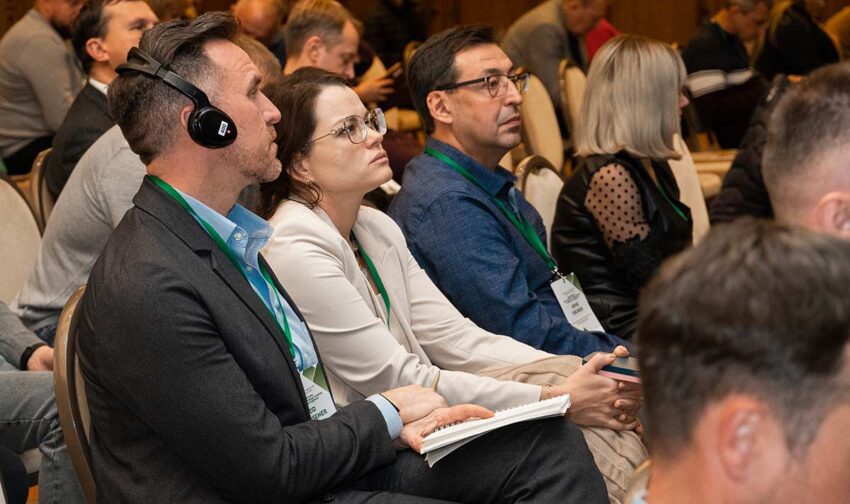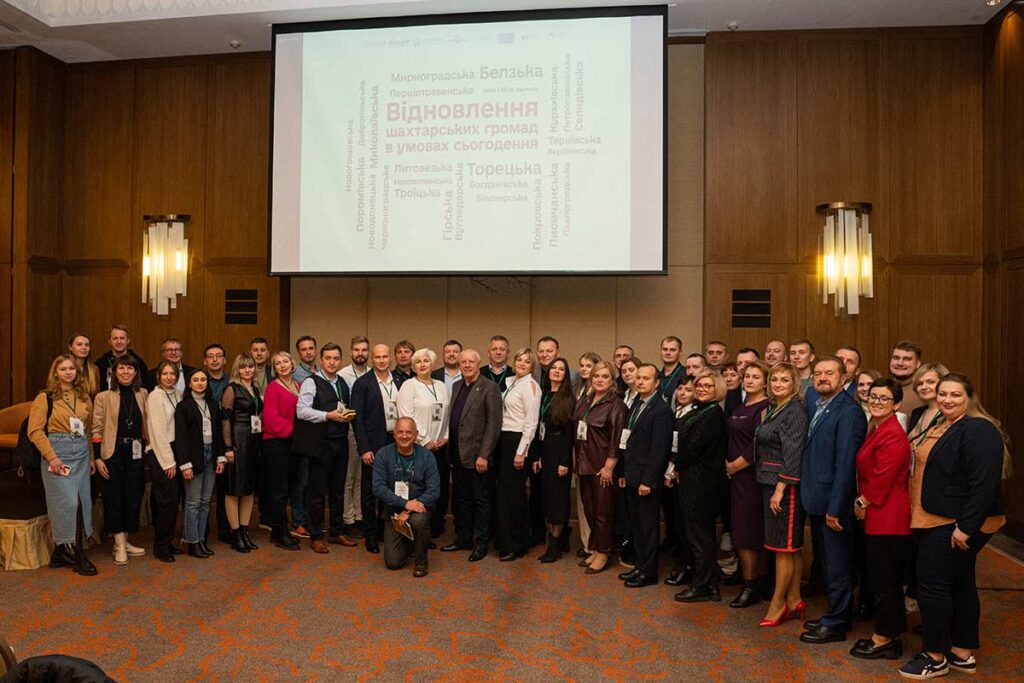How to transform coal mining communities in the context of recovery? Highlights from the Forum on Just Transition of coal communities

About 30 communities from 5 regions of Ukraine are involved in the coal industry and will have to undergo a just transition process, as Ukraine has confirmed its commitment to phase out coal by 2035. According to representatives of the Ministry of Communities, Territories and Infrastructure Development of Ukraine, work on the State Target Program for the Just Transition of Coal Regions until 2030 will resume in November 2023 and should be completed by the end of the first quarter of 2024.
This and the necessary steps towards the transition of coal mining communities were discussed during the 2nd Annual Ukrainian High-Level Forum on Just Transition “Reconstruction of Ukrainian coal mining communities in today’s conditions”. The event was organised by NGO Ecoaction, Luhansk Regional Human Rights Centre “Alternativa” and Germanwatch in partnership with the Ministry of Communities, Territories and Infrastructure Development, the Initiative for Coal Regions in Transition in the Western Balkans and Ukraine, and in cooperation with the Agency for Reconstruction and Development.
The event was attended by representatives of national, regional and local authorities, international organisations, ministries, business, academia and civil society. The participants shared their views on three main topics of the forum: taking into account the aspects of coal regions’ just transition during the reconstruction of Ukraine, provision of conditions for the return of citizens who left due to the Russian full-scale invasion, and energy transition in today’s conditions. The objective of the two-day Forum was to discuss which projects can help transform coal regions in a just way in these difficult conditions.

Panel discussion 1: How to take into account the aspects of coal regions’ just transition during the reconstruction of Ukraine?
Key points:
- From the point of view of Chervonohrad, which is already in the process of planning and implementing a just transition plan, its important components should include people’s trust and communication between different levels of government (including the Ministry of Energy), and community involvement in national policy planning. The need to have “clear rules” established by national authorities was emphasised, in terms of conditions for coal mining communities and legal requirements. It is important for communities to have detailed planning of the transition processes, as well as communication with the population about these processes, including through the involvement of various groups in the discussion. Transition measures should be systematic and consistent in their implementation, and should be adjusted as necessary to keep the process moving.
- The projects implemented by coal communities in western Ukraine can serve as inspiring examples for transition in eastern communities, which are currently hampered by the war. However, the implementation of green transition projects by coal mining communities can be problematic without external support from the state, investors, and responsible businesses.
- For the coal mining communities of Donetsk region, it is important to pay attention to the restoration of land damaged by the war and the coal industry, improving the transport system, creating conditions for local business, restoring heat and water supply, and taking into account social aspects such as healthcare, education, etc.
- It is important to have a roadmap for the green transition and timeframes, clear conditions for doing business in coal communities so that they become attractive to investors, and appealing for people to return home and with possibility to have jobs locally.
- International partners will not allocate funds to rebuild and support the coal industry. Therefore, we need to be one step ahead and think about how coal mining communities can become positive examples of green recovery. The example of coal mining communities can show how to make Ukrainian communities more energy efficient, develop decentralised generation, improve energy security, etc.

Panel discussion 2: Provision of conditions for the return of citizens who left due to Russian full-scale invasion.
Key points:
- Jobs have been lost as a result of the war, but if the recovery is green, there is an opportunity to create new jobs for those people who will return.
- Hirske community in Luhansk region suffered significant damage, including to coal mining facilities. 78% of the population was evacuated and they are still in contact with municipality. After the territory is de-occupied, the community’s economy will need to be rebuilt from scratch. It will also be important to rebuild infrastructure, ensure the development of social and logistics infrastructure, water and other basic resources, and introduce support for small and medium-sized businesses.
- The coal mining communities that have suffered significant damage will need construction workers. Therefore, retraining in construction professions could be one of the employment opportunities for miners.
- The coal mining communities in western Ukraine that have hosted internally displaced people are interested in keeping them in their communities. To this end, they are ready to actively engage in economic development, provide benefits, engage the population and ensure inclusiveness.
- For businesses to be able to develop as part of the post-war recovery in the Donetsk region, security guarantees and cooperation between business and the state are needed. It will be important to find ways to attract businesses – it is likely that relocated businesses will not return, but it may be worth pursuing geographical diversification.
- It is important to plan the restoration of coal mining communities in Donetsk and Luhansk regions now with the involvement of the public. The staffing crisis is already evident, and if we wait until after the victory to plan for the recovery, there may be no one to plan for.

Panel discussion 3: Energy transition in today’s conditions
Key points:
- Decentralisation of the energy system is in the interests of communities, as it allows for the use of a local distribution network, diversification of energy resources, and, as a result, energy independence of communities. At the same time, it is important to provide for energy storage and generation systems at the local level.
- With a focus on the future and the green transition, it is necessary to introduce renewable energy sources (solar panels for self-consumption, social infrastracture, wind farms) and use the potential of bioenergy (for example, if the region has an agricultural sector, it is possible to use its production waste).
- Currently, the main challenges for local green energy development are:
- lack of qualified personnel;
- non-market pricing of energy resources reduces the chances for investment;
- difficulty in connecting to power grids;
- shutdown of industrial enterprises, lack of economic activity;
- infrastructure capabilities of cities vary, and the system of cooperation between the national authorities and local self-government needs to be improved;
- financing problems, lack of involvement of local businesses and local resources.
- Unless consumption is reduced, any introduction of renewable energy sources will be very expensive. We need to work on demand reduction, energy efficiency, and forcasting (we need to know exactly when, what, and where it is produced, when demand increases, and adapt the system to these indicators). It is necessary to reduce consumption both in homes and in municipal infrastructure systems.
- NGOs play an important role in raising awareness of various international grant and sponsorship opportunities, as well as assisting in their receipt and implementation, communication and exchange of experience with international partners.

Representatives of the coal communities presented project concepts that have been developed over the past few months as part of the Project Workshop for Coal Mining Communities. In addition, during the second day of the Forum, representatives of the coal mining communities had the opportunity to learn more about the opportunities provided by the Initiative for Coal Regions in Transition in the Western Balkans and Ukraine, to communicate about support programs with representatives of international financial institutions and to exchange experience with representatives of the Małopolska Voivodeship of Poland on planning and implementing transition plans, as well as attracting investments for the transition of coal regions.